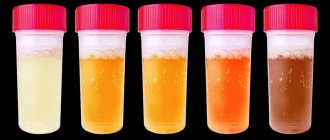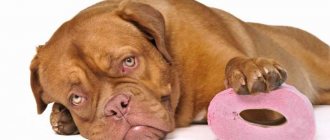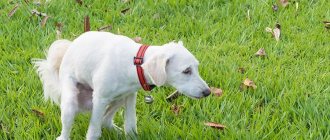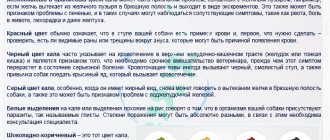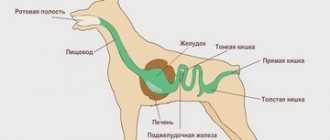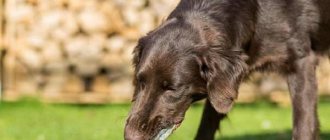Symptoms
There are acute and chronic indigestion. Acute diarrhea manifests itself up to two days. If there are no accompanying symptoms (fever, convulsions, vomiting, etc.), most likely this is a reaction to the food or its change.
Chronic lasts up to two weeks. In this case, it may indicate a disease: gastritis, enteritis, etc.
Black or red color of stool indicates the presence of blood in it. To exclude the possibility of it getting in from the outside, the dog’s anus is examined for cracks, wounds, and other injuries. Black (tar-like) or “melena” indicates digested blood. More often occurs with bleeding in the upper gastrointestinal tract. Red – for bleeding of the large intestine. She does not have time to be exposed to enzymes.
Most often, bloody diarrhea is a sign of a life-threatening pathology. You should contact your veterinarian as soon as possible.
Bloody diarrhea and vomiting in a dog: How to help at home
What can be done at home if the owner notices that his dog has loose stool mixed with blood and is vomiting?
- You can't scold a dog . She understands that she stains things, carpets, and can’t wait to go for a walk. But at this moment she does not understand what is happening to her, and is also experiencing severe pain.
- The owner needs to calm down the panic . Remember the time of the last walk, the condition of the animal before it, find a veterinary passport with the dates of the pet’s vaccination, take your passport and go to the nearest clinic to stop the bleeding.
- No amateur activities or self-medication . All that an owner can do if a dog has loose stools with blood and vomiting is to immediately take it to a veterinary clinic.
Read the article “Glands under the dog’s tail: Examination, prevention, treatment” – https://strazhchistoty.ru/cleanup/cleandogs/zhelezy-u-sobaki-pod-hvostom.html
Causes
Bloody diarrhea in a dog can be a symptom of:
- Parvovirus enteritis. Most affected puppies die between the ages of 2 and 18 months. The stool is initially mucous, then watery, and finally becomes bloody with a foul odor. The dog is vomiting foam.
- Leptospirosis. Bloody diarrhea indicates the severity of the disease. The animal quickly dies.
- Chemical poisoning. The dog can pick them up on the street.
- Traumatic enterocolitis. The cause may be sharp edges of swallowed bones or sticks, or other inedible objects.
- Chumki. Along with diarrhea, the dog may experience mucous discharge from the nose and eyes, photophobia, lethargy, and weakness. The temperature rises above 40 degrees.
- Long-term use of non-steroidal anti-inflammatory drugs for humans and glucocorticoids.
- Helminthiasis, dysbacteriosis. Worms (nematodes, liver flukes) damage the intestinal mucosa, which is penetrated by a network of blood vessels. As a result, they begin to bleed. With dysbiosis, the intestinal walls are damaged by small particles of food.
- Intestinal infections in puppies due to severe stress and immunodeficiency.
- An atypical form of rabies with a severe form of gastroenteritis.
- Tumors. Growing into the intestinal walls, they damage the mucous membrane, blood vessels, and tissues, causing bleeding. May lead to purulent peritonitis. Neoplasms are more often observed in adult animals.
Treatment of diseases that manifest as bloody diarrhea
Often, the causes of bloody diarrhea in a dog are eliminated with the help of medications, although in some cases it is necessary to resort to surgical removal of the root cause of the disorder. Sometimes folk remedies are a good addition to the main therapy, but in any case it is worth knowing about the features of each specific treatment regimen for red stool.
Medications
Treatment of bloody diarrhea in dogs begins only after an accurate determination of the cause of its occurrence, therefore, depending on the specific problem, the following medications are chosen to eliminate it:
- If helminthiasis is the reason for the liquefaction and redness of the stool, you should turn your attention to anthelmintic drugs, which include Dirofen, Vermox, Helminthal. The dosage and frequency of administration of each of them is prescribed by the doctor, taking into account the complexity of the case and the weight of the dog.
- To stop bleeding, I use homostatic medications, which include aminocaproic acid, calcium chloride and vikasol.
- In case of severe poisoning that requires intensive treatment, the animal is prescribed a course of drips with saline solution to restore fluid loss, antibiotics to combat infectious diseases and probiotics, which restore the intestinal microflora after antibacterial therapy. Drugs such as Levomecitin, Enterosept, and Furazolidone help eliminate intestinal infections.
- In the fight against viral diseases of the gastrointestinal tract, immunostimulating substances and vitamin complexes are used.
- A tumor or a foreign object swallowed by a dog can only be removed surgically. After surgery to remove a malignant tumor, the dog is additionally prescribed a course of chemotherapy or special radiation to prevent re-growth of the tumor due to metastases remaining in the gastrointestinal tract.
At home, to stop diarrhea in a dog caused by food poisoning, the owner can use the well-known medicine “Loperamide”, and the well-known “Regidron” is perfect for restoring the water-salt balance of the body. It effectively relieves all symptoms of dehydration caused by diarrhea. If an increase in body temperature is added to an upset stomach, then antipyretic drugs (for example, Analgin or No-shpu) are used for symptomatic treatment.
Important! If standard means fail to stop bloody diarrhea within 24 hours, then the cause of its occurrence is not trivial food poisoning and urgent medical attention is required. Every day of delay in contacting a veterinarian threatens a significant deterioration in the pet’s health, and in some cases even death.
Folk remedies
It is better not to use traditional medicine recipes without first consulting a veterinarian, otherwise there is a serious possibility of only aggravating the situation. Typically, the following remedies are effective for gastrointestinal problems:
- Chamomile decoction acts as a natural antiseptic and antispasmodic. For diarrhea, take the medicine 15–20 ml 3–5 times a day.
- Oak bark decoction. The finished liquid has astringent properties, which makes it possible to stop diarrhea and normalize stool. Reception rate: 1 tbsp. spoon twice a day.
- St. John's wort infusion. Like the previous medicine, this drink has astringent properties, and to combat diarrhea in an adult dog, it is given 1 tablespoon of the drug 1-2 times a day.
When choosing a particular herb for treatment, the dog owner should not forget about a possible allergic reaction to its components. For this reason, it is recommended to start dispensing decoctions and infusions with a teaspoon, and if after a day there is no deterioration in health, then proceed to the dosages indicated in the recipe.
How to feed your dog during recovery
The animal’s nutrition during the rehabilitation period plays a primary role in the speed of all recovery processes in the body. Since the organs of the gastrointestinal tract are the target of damage, it is logical that all food should be easily digestible, without irritating the already damaged mucous membrane of the esophagus and stomach.
On the first day of the appearance of bloody diarrhea, the dog is not fed at all, but after a day you can give it dietary products in liquid form: for example, rice water, which has worked well with any diet.
As soon as the diarrhea stops and the pet becomes more active, he is offered rice cooked in chicken broth. At the beginning, portions should be very small (no more than two tablespoons), but the frequency of feeding usually reaches 5-6 times a day. On the second day, portions are increased, maintaining the frequency of feedings.
2 days after the cessation of bloody diarrhea, after consulting with a veterinarian, a little kefir, fermented baked milk or any other fermented milk product is introduced into the diet, and another day later it is allowed to give the pet a boiled egg, boiled chicken breast or beef, preferably cut into small pieces.
We recommend reading about the causes and treatment of diarrhea with mucus in dogs.
In the case where the cause of bloody diarrhea turned out to be a tumor and it had to be removed urgently, the starvation diet can extend for 2-3 days from the moment of surgery. All this time, the dog is administered nutrients intravenously or, with the permission of the doctor, is fed low-fat broths. Throughout the recovery period, it is important to give your pet only fresh food, just like at other times.
Diagnostics
At the clinic, the dog is examined and anamnesis is collected. A general blood test is performed. The degree of blood loss is assessed by the level of hemoglobin. The white blood cell count indicates the degree of inflammation and response to infectious agents.
Fecal analysis can identify helminth eggs and detect protozoa. Using bacterial culture, pathogens are detected and their sensitivity to antibiotics is determined. The polymerase chain reaction (PCR) method is aimed at identifying pathogens of infectious diseases.
An abdominal x-ray is taken to detect a foreign body or perforation of the intestine or stomach.
To clarify the diagnosis, additional tests may be performed:
- biochemical blood test to assess the condition of the liver, kidneys, heart in case of severe blood loss, dehydration, and the effects of toxins;
- Ultrasound of the abdominal cavity if peritonitis is suspected allows you to detect free fluid and estimate its volume;
- gastroscopy is performed if bleeding from the upper gastrointestinal tract is suspected;
- A colonoscopy is done if bleeding from the lower intestine is suspected.
First aid
Before visiting the veterinarian for your dog:
- give Smecta, Enterosgel, Neosmectin, activated carbon (at the rate of 1 tablet per 10 kg of weight). They help remove toxic substances from the body;
- drink decoctions of oak bark, chamomile, St. John's wort. They have an astringent, anti-inflammatory effect;
- they give No-shpu, Papaverine to ease intestinal spasms and normalize intestinal motility;
- give Bifidumbacterin, Lactobifidol to normalize the intestinal microflora.
An adult dog should not be fed until 24 hours, a puppy - until six. Drinking should be plentiful. If the animal refuses to take the liquid on its own, it is given water from a syringe.
These remedies are only a temporary measure aimed at alleviating the animal’s condition. According to reviews from dog owners on forums, the pet should be taken to the clinic as quickly as possible.
Main rules
If your pet has an upset stomach, it is not recommended to overload the body with food (you can not feed it for 1-2 days). It is weakened, so it is not able to process food. If the condition does not improve, you will need to put the animal on a diet, gradually switching to familiar foods.
You cannot scold your pet: restraining the urge is harmful, since toxins poison the entire body. Important! Don't forget to give your pet water. During diarrhea, dehydration occurs. If he refuses to drink, then you can forcefully inject water in small portions using a syringe without a needle.
Treatment
In the hospital, droppers with Ringer-Locke solution are required to replenish the dog’s water balance. They give medications to improve blood clotting: Vikasol, Calcium Gluconate, Dicion, etc. To stop vomiting, they give Cerucal.
In severe cases of anemia or hemophilia, transfusion of blood or its components is necessary.
Diarrhea due to viral and bacterial infections is treated with immunomodulators. To treat bacterial infections, antibiotics are used - Tylosin, Sulgin, Diarcan. They have no effect on viruses.
For protozoal infections caused by protozoa, Metronidazole is indicated.
In case of food poisoning and toxic infections, antidiarrheals are not given so as not to delay the removal of toxins from the body.
Helminthiasis can be treated with anthelmintic drugs. One of the best is Drontal.
Surgery is required if a foreign body or tumor is found. To treat the tumor, chemotherapy and radiation therapy are prescribed.
If there is significant blood loss, transfusion is indicated.
